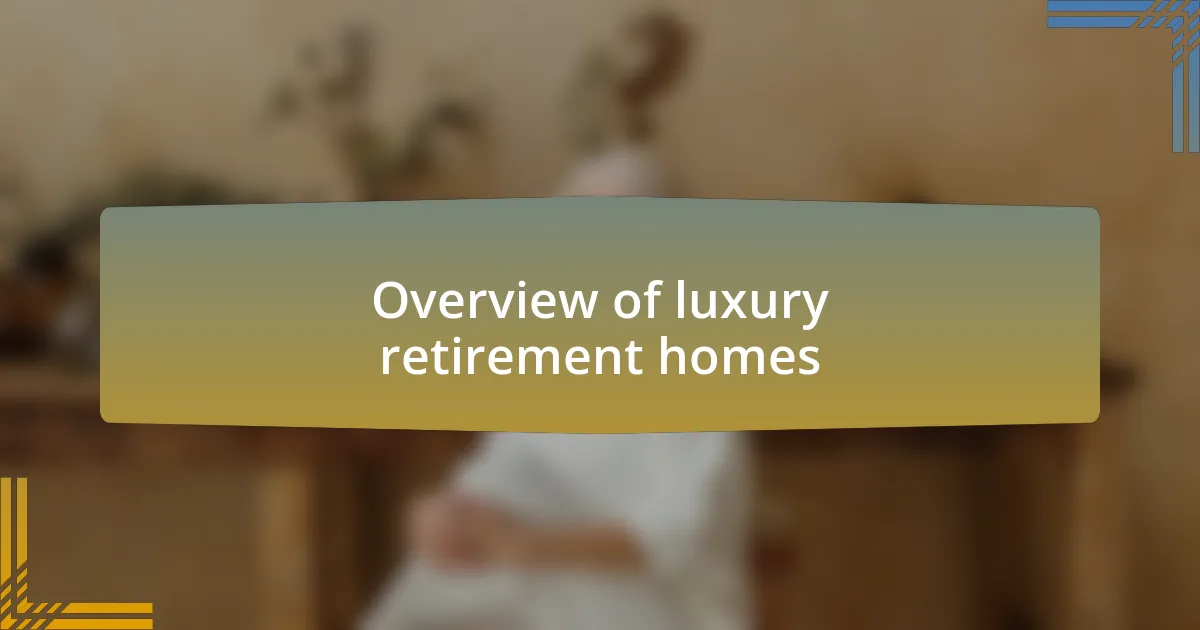Key takeaways:
- Tax planning involves making informed decisions to minimize liabilities, emphasizing the difference between legitimate tax avoidance and illegal evasion.
- Luxury retirement homes enhance quality of life through personalized services, social engagement, and a sense of community for seniors.
- Strategies for tax-efficient home ownership include utilizing property tax exemptions for seniors and consulting tax professionals for potential deductions.
- Personal tax planning tips include diligently tracking medical expenses, benefiting from charitable donations, and timing income and expenses strategically to manage tax liability.

Understanding tax planning concepts
Tax planning may seem daunting, but at its core, it’s about making informed decisions to minimize tax liabilities. I remember a time when I faced a tax bill that caught me by surprise. It made me realize how crucial it is to strategize and allocate resources effectively. Have you ever considered what it would feel like to have a clear path for your financial future?
One key concept in tax planning is understanding the distinction between tax avoidance and tax evasion. I’ve seen friends mistakenly conflate the two, leading to unnecessary stress and legal trouble. Tax avoidance is legitimate and encouraged; it’s about using legal methods to reduce taxes. On the other hand, evasion can lead to crippling consequences, making it essential to tread carefully.
Another important aspect is the timing of income and deductions. Personally, I found that shifting certain deductions to different tax years helped me maximize my benefits. For example, I once deferred a significant bonus, which lowered my taxable income for that year. Have you ever thought about how timing could influence your tax situation? It’s surprising how simple shifts can lead to substantial savings when planned correctly.

Overview of luxury retirement homes
Luxury retirement homes are designed to offer a serene and fulfilling lifestyle for seniors who wish to enjoy their golden years in comfort and style. I recall visiting a friend at a stunning facility that boasted resort-like amenities, such as fine dining, fitness classes, and even an art studio. It made me think about how these environments not only ensure safety and healthcare but also encourage social engagement, which is so vital at that stage of life.
In essence, these homes provide an elevated living experience that goes beyond basic care. I remember speaking with residents who shared their joy about forming new friendships and participating in lively activities. This sense of community is something I believe can truly enhance one’s quality of life, making the transition into retirement much more enjoyable.
Moreover, luxury retirement homes often prioritize personalization, tailoring their services to meet individual needs and preferences. I’ve seen firsthand how this approach can transform the elderly experience— from personalized meal plans to tailored healthcare services, it creates an environment where residents feel valued and respected. Have you ever thought about how such attention to detail can enhance the sense of belonging for seniors? It’s these small yet significant touches that can truly make a difference in their daily lives.

Strategies for tax-efficient home ownership
Homeownership, especially in luxury retirement settings, can be optimized for tax efficiency, which comes down to a few smart strategies. One approach I’ve personally found effective is taking advantage of property tax exemptions available for seniors. In many areas, these exemptions can significantly reduce one’s annual tax burden, allowing more funds to be allotted to leisure and wellbeing, which is what retirement is all about.
Another tactic involves considering the tax implications of home equity. I once helped a family navigate the benefits of a reverse mortgage. This option not only provided them with cash flow during retirement but also allowed them to retain home ownership while defering taxes. It’s a reminder that finding the right financial arrangement can enhance one’s lifestyle and provide peace of mind.
Lastly, I believe it’s essential to consult with a tax professional who understands the nuances of real estate in retirement. From personal experience, they can uncover potential deductions and strategies that many homeowners overlook. After all, wouldn’t it be nice to keep more of your hard-earned money while enjoying everything a luxury retirement home has to offer?

Personal tax planning tips
One of the most beneficial tips I’ve found in personal tax planning is to always track your medical expenses. As we age, medical costs can add up quickly, and I remember one year where I was surprised by how much I could deduct. You might want to keep receipts for everything from prescriptions to dental work. Have you thought about how those expenses could actually work in your favor when tax season rolls around?
Additionally, consider the tax benefits attached to charitable giving. I have always felt a deep sense of purpose when donating to causes I believe in, and the bonus is that it can provide valuable deductions. If you’re regularly contributing to charity, be sure to document your donations—every little bit adds up. It really does feel wonderful to give back while also benefiting your tax situation.
Another thing I’ve learned is the importance of timing your income and expenses. For instance, I once opted to delay a retirement fund withdrawal to avoid pushing myself into a higher tax bracket that year. I can assure you, taking a strategic approach to managing when you receive income can make a noticeable difference in your tax liability. Have you ever considered how simple adjustments in timing might impact your finances in retirement?